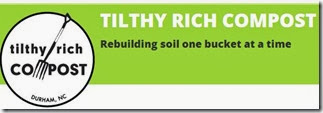A few months ago, a start-up in Durham, North Carolina where I live began Tilthy Rich Compost, a business that picks up food scraps from subscribers on a weekly basis, then turns it into compost a few miles from downtown.
Currently, the service area is approximately a five mile radius of downtown and expanding. Pick up is mostly by bicycle for neighborhoods and a truck service for commercial clients.
The company will even return the finished compost to you if you wish, for use in your garden or landscape. They also offer the service to restaurants, commercial kitchens and cafeterias.
At our house, we only eat at home a few days a week, but they have a smaller bucket for people like us and a larger bucket for families that eat at home regularly.
The new company is emblematic of Durham’s distinctive entrepreneurial personality, in particular social entrepreneurship.
Forty percent of the nation’s food supply goes to waste and I am sure Durham is no exception. Residential food scraps alone make up 12.4% of municipal waste across America, a greater percentage than plastic.
In restaurants, according to the report Wasted, analysts at the Natural Resources Defense Council calculate that 4% to 10% of food becomes waste during preparation before it gets to the consumer. Another significant portion is served but not eaten.
Approximately 10% of fast food is discarded because it has been prepared but not purchased within safe time limits. At home, Americans throw out approximately 25% of the food and beverages they buy.
Often, if you are like us, food products are discarded either because plans change and they spoil or because I in particular am one of those people perpetually confused by “use by” and “best by” date labels.
Even before consumers buy groceries, a food industry consultant estimates that up to one in seven truckloads of perishables delivered to supermarkets has to be thrown away.
Analysis in the United Kingdom estimate that if food scraps were removed from landfills there, greenhouse gas abatement would be the equivalent of removing a fifth of all cars in that country from the roads.
By the time I retired four years ago, 90 cities and towns in the U.S. had begun offering food waste collection, double from two years before. North Carolina composts below the average for the Southeast.
I suspect though, that a personalized and scalable service such as Tilthy Rich Compost will always be in demand. In our part of the country, as a developer-friend of mine jokes, soil so easily becomes compacted that it almost qualifies as impervious.
We need all of the compost we can get.
No comments:
Post a Comment